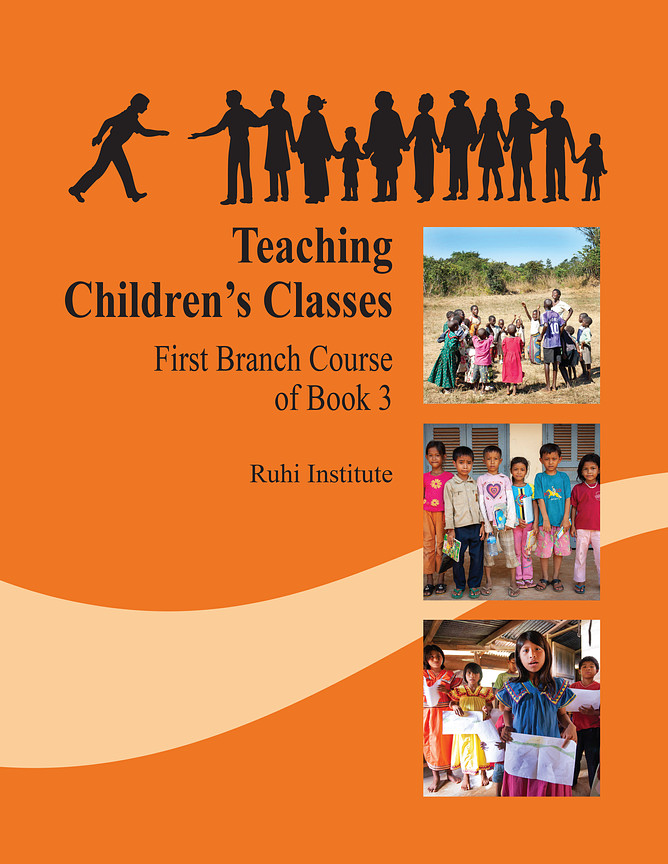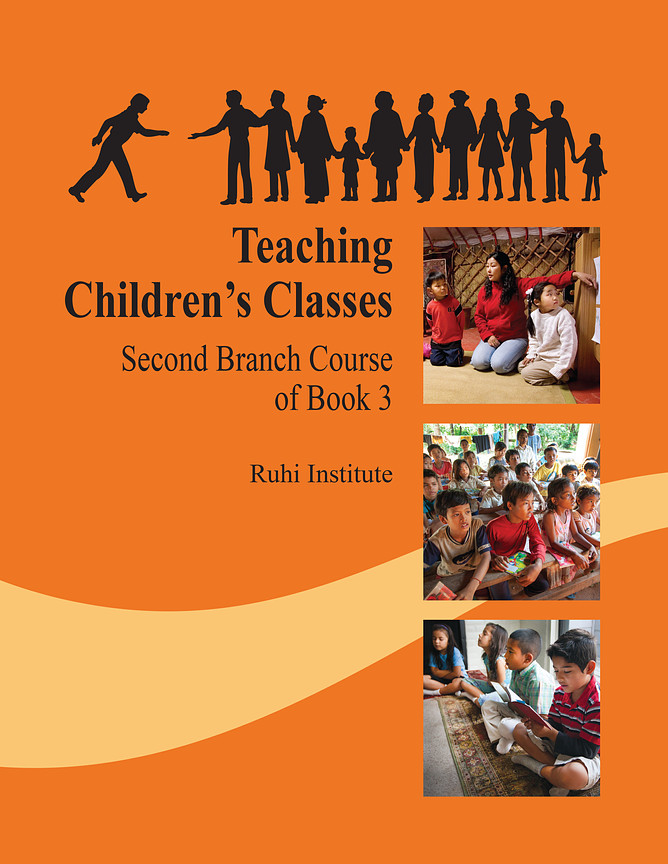Walking a path of service
Although the conceptual framework that guides the work of the Ruhi Institute addresses the spiritual growth of the individual, it is recognized that an individual’s spiritual condition and his or her progress are matters that only God can judge and that human beings should not presume to measure. The Institute has therefore adopted a pedagogical approach that concerns itself exclusively with ways in which individuals can be helped to increase their capacity to serve. This capacity, while intimately connected with spirituality, operates in relation to it in ways that need not be defined precisely. It suffices to understand that the field of service represents the environment within which spirituality can be cultivated.
A systematic process of spiritual education is set in motion when individuals are accompanied along paths of service which they have chosen to follow, according to their interests and capabilities. Building on experience gained in working among populations in Colombia, the Ruhi Institute has marked out specific “paths of service”. Understanding is fostered along each path through a series of courses, some of which impart the skills and attitudes needed to perform acts of service, while others present spiritual teachings and precepts that endow these acts with meaning.
As suggested by the foregoing, the Institute’s main sequence of courses is not arranged according to a series of subject matters, with the specific aim of increasing individual knowledge. The content and order are based, rather, on a series of acts of service, the practice of which creates capacity in the individual to meet the exigencies of dynamic, developing communities. And as also noted above, the enhancement of such capacity is viewed in terms of “walking a path of service”. On such a path individuals are assisted first in accomplishing relatively simple tasks and then in performing more complex and demanding acts of service. This is the nature of capacity building: Someone accompanies you as you learn to walk the path by yourself. If you fall, there is somebody close by to give you a hand. Mistakes are accepted. Confidence is gradually built. Setting grandiose goals and whipping up enthusiasm through constant emotional appeals are avoided.
The acts of service treated in the Institute’s main sequence of courses are intended, then, to establish a dynamic pattern of action that will lead to the sound development of local communities. This pattern of action involves the establishment of devotional meetings, a program of home visits, children’s classes, junior youth groups and study circles—reinforced by individual and collective efforts to share the teachings of Bahá’u’lláh in numerous settings.
In addition to its main sequence, the Ruhi Institute is developing at least two sets of courses branching off from it. These branch courses allow participants to follow more specialized paths of service, while they continue their study of the main sequence. Courses in the first set will offer training to those interested in child education; those in the second will develop capacity for working with junior youth.
A description of the course materials in the main sequence, as well as its two branches, is provided below. In general, small groups of participants, working with the assistance of a tutor, meet together in an atmosphere of joy, calm and meditative serenity to engage in close study of the course materials. The capacity-building process to which the study of the materials is giving rise around the world is described by the Universal House of Justice with these words:
“Thousands upon thousands, embracing the diversity of the entire human family, are engaged in systematic study of the Creative Word in an environment that is at once serious and uplifting. As they strive to apply through a process of action, reflection and consultation the insights thus gained, they see their capacity to serve the Cause rise to new levels. . . .”
21 April 2008 message from the
Universal House of Justice
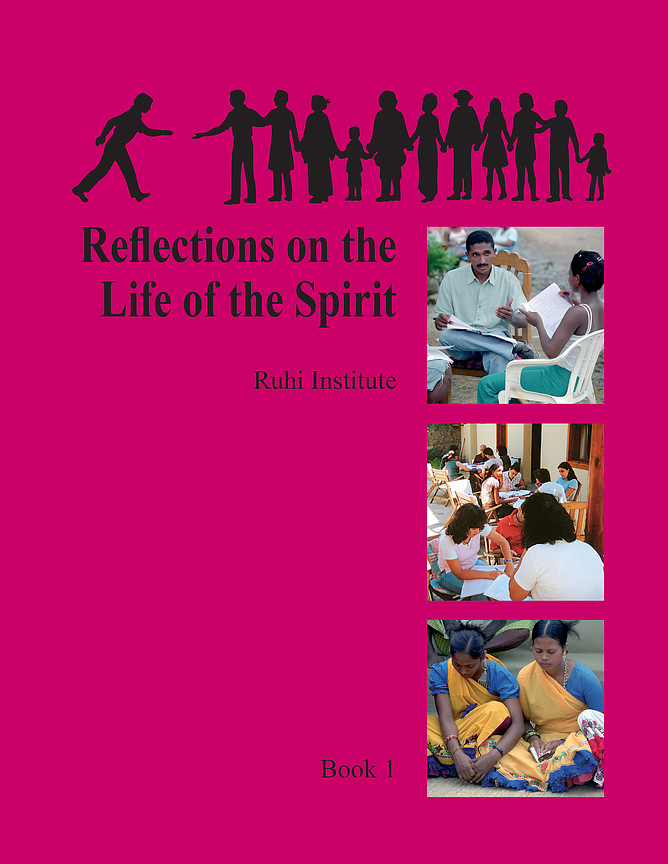
The first book in the sequence of courses is largely concerned with the question of identity. What is the real identity of the “I” in the sentence “I walk a path of service”? Three aspects of individual identity are explored in the book: “The reality of my existence is my soul which passes through this world to acquire the attributes it needs for an eternal and glorious journey towards God. My most cherished moments are those spent in communion with God, for prayer is the daily nourishment that my soul must receive if it is to accomplish its exalted purpose. One of my principal concerns in this life is to study the Holy Writings, strive to increase my understanding of the divine teachings, and learn to apply them to my own daily life and to the life of the community.” The book consists of the units “Understanding the Bahá’í Writings”, “Prayer”, and “Life and Death”. It encourages those who study it to take a first step on the path of service by hosting a meeting for prayer and worship in their home.
“Responding to the inmost longing of every heart to commune with its Maker, they carry out acts of collective worship in diverse settings, uniting with others in prayer, awakening spiritual susceptibilities, and shaping a pattern of life distinguished for its devotional character.”
21 April 2008 message from the Universal House of Justice
Reflections on the Life of the Spirit
Book 1
The first book in the sequence of courses is largely concerned with the question of identity. What is the real identity of the “I” in the sentence “I walk a path of service”? Three aspects of individual identity are explored in the book: “The reality of my existence is my soul which passes through this world to acquire the attributes it needs for an eternal and glorious journey towards God. My most cherished moments are those spent in communion with God, for prayer is the daily nourishment that my soul must receive if it is to accomplish its exalted purpose. One of my principal concerns in this life is to study the Holy Writings, strive to increase my understanding of the divine teachings, and learn to apply them to my own daily life and to the life of the community.” The book consists of the units “Understanding the Bahá’í Writings”, “Prayer”, and “Life and Death”. It encourages those who study it to take a first step on the path of service by hosting a meeting for prayer and worship in their home.
“Responding to the inmost longing of every heart to commune with its Maker, they carry out acts of collective worship in diverse settings, uniting with others in prayer, awakening spiritual susceptibilities, and shaping a pattern of life distinguished for its devotional character.”
21 April 2008 message from the Universal House of Justice
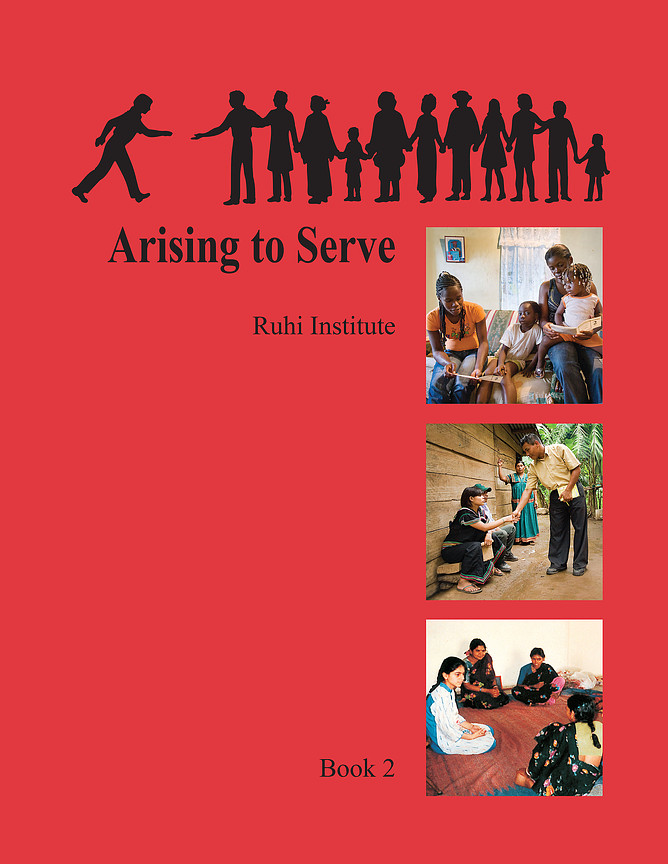
Book 2 of the main sequence considers what it means to walk a path of service. It consists of three units. The first explores the nature of the joy one derives from serving others, while the next two focus on the knowledge, abilities and qualities needed to enter into conversations that are uplifting to the mind and spirit. The ability to elevate day-to-day conversations by introducing spiritual principles, when the occasion calls for it, is addressed in the second unit. The third, then, turns to community life. Visiting friends and neighbors in their homes to discuss themes central to spiritual and social existence—the second act of service encouraged in the main sequence—strengthens ties of unity and fellowship, so essential to collective life. The three units are entitled: “The Joy of Teaching”, “Uplifting Conversations”, and “Deepening Themes”.
“As they call on one another in their homes and pay visits to families, friends and acquaintances, they enter into purposeful discussion on themes of spiritual import . . . and welcome increasing numbers to join them in a mighty spiritual enterprise.”
21 April 2008 message from the Universal House of Justice
Arising to Serve
Book 2
Book 2 of the main sequence considers what it means to walk a path of service. It consists of three units. The first explores the nature of the joy one derives from serving others, while the next two focus on the knowledge, abilities and qualities needed to enter into conversations that are uplifting to the mind and spirit. The ability to elevate day-to-day conversations by introducing spiritual principles, when the occasion calls for it, is addressed in the second unit. The third, then, turns to community life. Visiting friends and neighbors in their homes to discuss themes central to spiritual and social existence—the second act of service encouraged in the main sequence—strengthens ties of unity and fellowship, so essential to collective life. The three units are entitled: “The Joy of Teaching”, “Uplifting Conversations”, and “Deepening Themes”.
“As they call on one another in their homes and pay visits to families, friends and acquaintances, they enter into purposeful discussion on themes of spiritual import . . . and welcome increasing numbers to join them in a mighty spiritual enterprise.”
21 April 2008 message from the Universal House of Justice
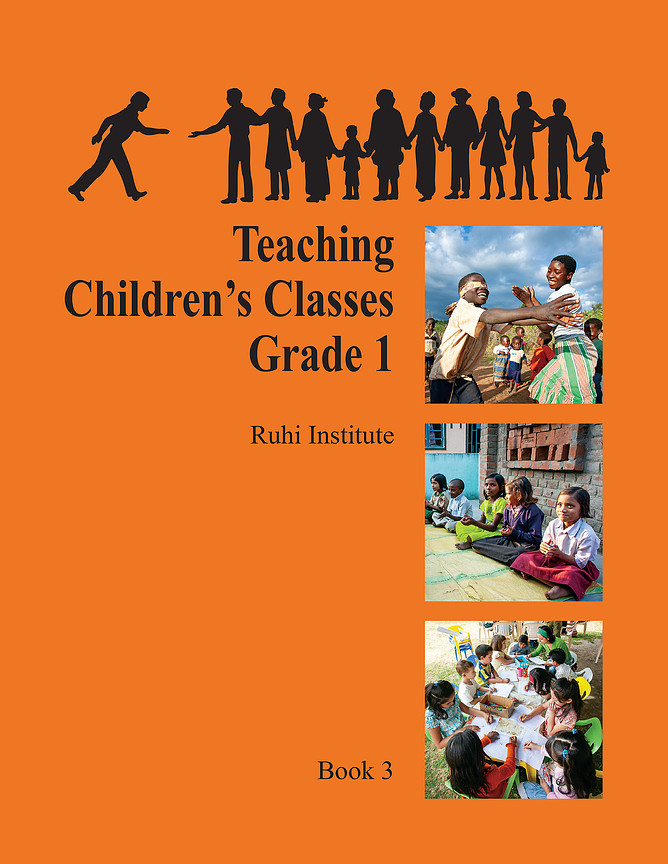
The third act of service addressed by the Ruhi Institute is in the area of the spiritual education of children. The education of children is essential to the transformation of society. Book 3 focuses on some of the knowledge, skills and qualities necessary for those wishing to enter this important field of service. It consists of two units, “Some Principles of Bahá’í Education” and “Lessons for Children’s Classes, Grade 1”. The first unit examines certain principles and concepts inherent to education from a Bahá’í point of view. It also discusses how a teacher can manage a class with a great deal of love and understanding and, at the same time, with the discipline necessary to create a proper learning environment. The second unit offers a set of twenty-four lessons intended to foster the development of spiritual qualities in small children—qualities like honesty, generosity, and trustworthiness. Some preparatory material for teachers is also included.
“Aware of the aspirations of the children of the world and their need for spiritual education, they extend their efforts widely to involve ever-growing contingents of participants in classes that become centres of attraction for the young and strengthen the roots of the Faith in society.”
21 April 2008 message from the Universal House of Justice
Teaching Children’s Classes, Grade 1
Book 3
The third act of service addressed by the Ruhi Institute is in the area of the spiritual education of children. The education of children is essential to the transformation of society. Book 3 focuses on some of the knowledge, skills and qualities necessary for those wishing to enter this important field of service. It consists of two units, “Some Principles of Bahá’í Education” and “Lessons for Children’s Classes, Grade 1”. The first unit examines certain principles and concepts inherent to education from a Bahá’í point of view. It also discusses how a teacher can manage a class with a great deal of love and understanding and, at the same time, with the discipline necessary to create a proper learning environment. The second unit offers a set of twenty-four lessons intended to foster the development of spiritual qualities in small children—qualities like honesty, generosity, and trustworthiness. Some preparatory material for teachers is also included.
“Aware of the aspirations of the children of the world and their need for spiritual education, they extend their efforts widely to involve ever-growing contingents of participants in classes that become centres of attraction for the young and strengthen the roots of the Faith in society.”
21 April 2008 message from the Universal House of Justice
Implementing a Six-Year Program for the Spiritual Education of Children
Courses in the area of child education form a specialized branch in the Ruhi Institute’s series. Together with Book 3, they seek to train teachers to conduct classes for the spiritual education of children, from age 5 or 6 to 11 or 12. These courses become progressively more complex in nature, and it is envisioned that, upon their completion of this specialized branch, teachers will have acquired a substantial amount of knowledge about the field of education in general and will have developed fairly sophisticated skills related to lesson planning and classroom management.

Teaching Children’s Classes: First Branch Course of Book 3
This book, which builds on the experience gained in Book 3 in teaching classes for the spiritual education of children, is intended for those interested in pursuing this highly meritorious path of service. It presents an opportunity for participants to reflect on their first year conducting classes and provides them with lessons for children that seek to strengthen habits and patterns of conduct that are a manifestation of the spiritual qualities they learned about in Grade 1. The nine lessons, divided into sets of three, address themes related to an individual’s relationship with our Creator.

Teaching Children’s Classes: Second Branch Course of Book 3
Like the first branch course of Book 3, this one prepares teachers to conduct lessons that strive to reinforce habits and patterns of conduct associated with an upright and noble character. Divided into four sets of three, the twelve lessons address themes relevant to an individual’s relationship with his or her fellow human beings, such as “Living in Harmony with Others” and “Respecting Human Dignity”.
Teaching Children’s Classes: Third Branch Course of Book 3
(material in development)
The units that will make up this book are currently available in pre-publication form, and a description of their content is forthcoming.
Teaching Children’s Classes: Fourth Branch Course of Book 3
(material in development)
The units that will make up this book are currently available in pre-publication form, and a description of their content is forthcoming.
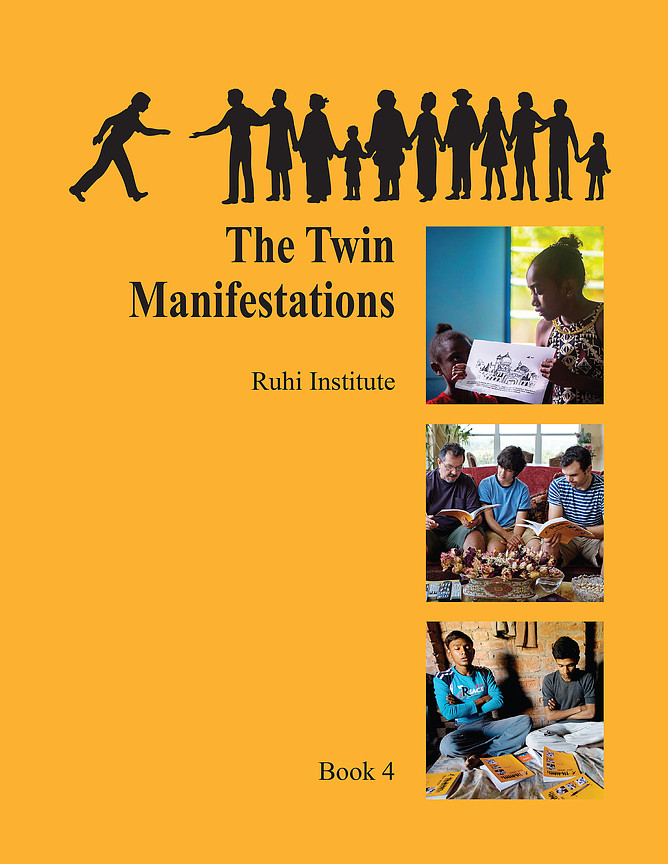
Book 4 in the main sequence returns to the question of identity, the “I” in the statement “I walk a path of service.” History shapes much of the identity of individuals, as well as entire peoples. The second and third units in the book are dedicated to the study of the life history of Bahá’u’lláh, the Author of the Bahá’í Faith, and His Forerunner, the Báb. In the first unit, the significance of this Day is briefly examined. Seeing clearly the elements that characterize the past enables individuals to contribute more effectively to shaping the future.
“As they call on one another in their homes and pay visits to families, friends and acquaintances, [they] deepen their knowledge . . . and welcome increasing numbers to join them in a mighty spiritual enterprise.”
21 April 2008 message from the Universal House of Justice
The Twin Manifestations
Book 4
Book 4 in the main sequence returns to the question of identity, the “I” in the statement “I walk a path of service.” History shapes much of the identity of individuals, as well as entire peoples. The second and third units in the book are dedicated to the study of the life history of Bahá’u’lláh, the Author of the Bahá’í Faith, and His Forerunner, the Báb. In the first unit, the significance of this Day is briefly examined. Seeing clearly the elements that characterize the past enables individuals to contribute more effectively to shaping the future.
“As they call on one another in their homes and pay visits to families, friends and acquaintances, [they] deepen their knowledge . . . and welcome increasing numbers to join them in a mighty spiritual enterprise.”
21 April 2008 message from the Universal House of Justice
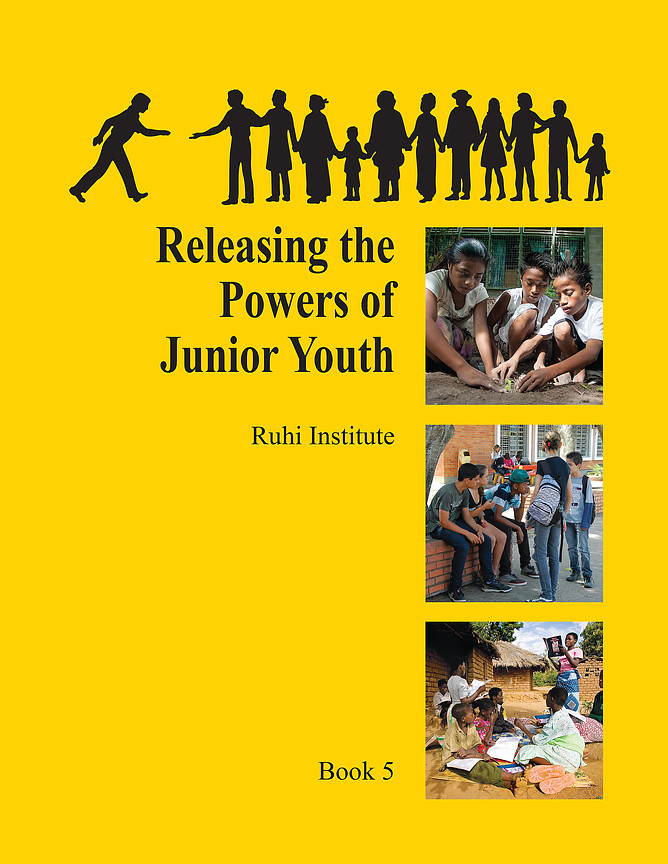
This book has a special place in the sequence of the Ruhi Institute. According to the Bahá’í teachings, an individual reaches the age of maturity at 15, when spiritual and moral obligations become binding. The years immediately before this age, then, take on special significance. This is the time when fundamental concepts about individual and collective life are formulated in the mind of an adolescent struggling to leave behind the habits of childhood. Youth between the ages of 12 and 15 have much to say, and whoever treats them as children misses the opportunity to help them form a proper identity. The three units that make up Book 5 focus on some of the concepts, skills, qualities, and attitudes that experience has shown are required by those wishing to implement a program for the spiritual empowerment of junior youth.
“They assist junior youth to navigate through a crucial stage of their lives and to become empowered to direct their energies toward the advancement of civilization.”
21 April 2008 message from the Universal House of Justice
Releasing the Powers of Junior Youth
Book 5
This book has a special place in the sequence of the Ruhi Institute. According to the Bahá’í teachings, an individual reaches the age of maturity at 15, when spiritual and moral obligations become binding. The years immediately before this age, then, take on special significance. This is the time when fundamental concepts about individual and collective life are formulated in the mind of an adolescent struggling to leave behind the habits of childhood. Youth between the ages of 12 and 15 have much to say, and whoever treats them as children misses the opportunity to help them form a proper identity. The three units that make up Book 5 focus on some of the concepts, skills, qualities, and attitudes that experience has shown are required by those wishing to implement a program for the spiritual empowerment of junior youth.
“They assist junior youth to navigate through a crucial stage of their lives and to become empowered to direct their energies toward the advancement of civilization.”
21 April 2008 message from the Universal House of Justice
Implementing a Program for the Spiritual Empowerment of Junior Youth
Courses for implementing a program for junior youth will form a specialized branch. Referred to as “animators”, those who enter this path of service will be helped to prepare themselves to work with young people between the ages of 12 and 15 and to familiarize themselves with the materials recommended by the Ruhi Institute for use with this age group, which currently include items with content inspired by the Bahá’í Faith, as well as those which treat specifically Bahá’í subjects. For a list of these titles, click here.
Initial Impulse
(material in development)
The units that will make up this book are currently available in pre-publication form, and a description of their content is forthcoming.
Widening Circle
(material in development)
The units that will make up this book are currently available in pre-publication form, and a description of their content is forthcoming.
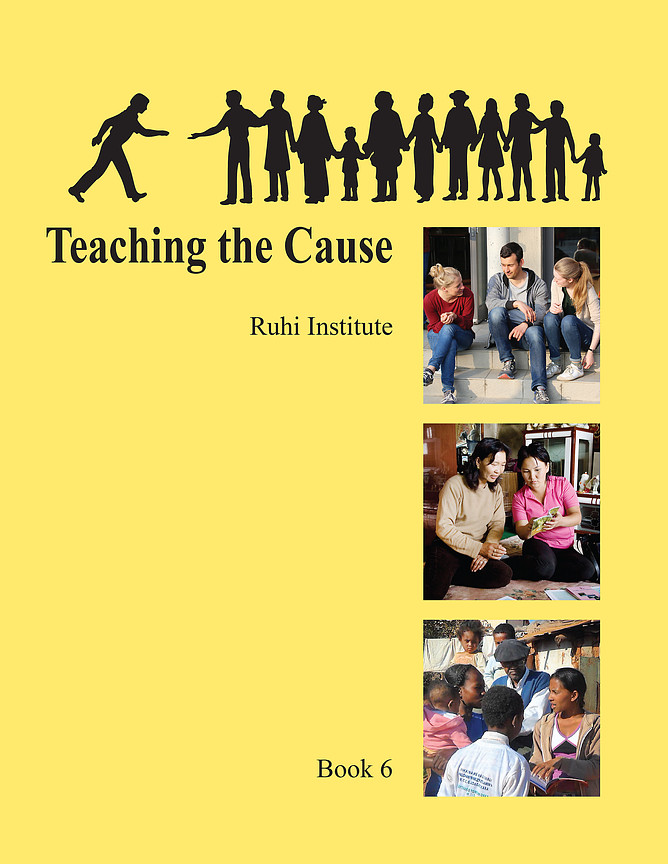
People from every background are welcome to explore the teachings of Bahá’u’lláh and learn how they can apply them to better their lives. All Bahá’ís, then, share liberally and unconditionally the teachings and precepts of their Faith. Although the propagation of Bahá’u’lláh’s message is one of the most essential services to be rendered, teaching is also a natural expression of a state of being—a state in which one is moved to share with others the knowledge and joy one finds in His Revelation. This concept is explored in the first unit of Book 6, “The Spiritual Nature of Teaching”. It takes as its premise the understanding that “being” and “doing” are inseparable aspects of a spiritual life. The second and third units, “Qualities and Attitudes Essential for Teaching” and “The Act of Teaching”, take this premise further. The second unit considers how one’s inner state contributes to, and is strengthened by, one’s efforts in the field of service, while the third looks at how the act of teaching should be approached. Of particular significance is the example offered in the third unit, through the story of Anna and Emilia, of how to introduce the Faith to someone who knows little about it.
“As they call on one another in their homes and pay visits to families, friends and acquaintances, [they] share Bahá’u’lláh’s message, and welcome increasing numbers to join them in a mighty spiritual enterprise.”
21 April 2008 message from the Universal House of Justice
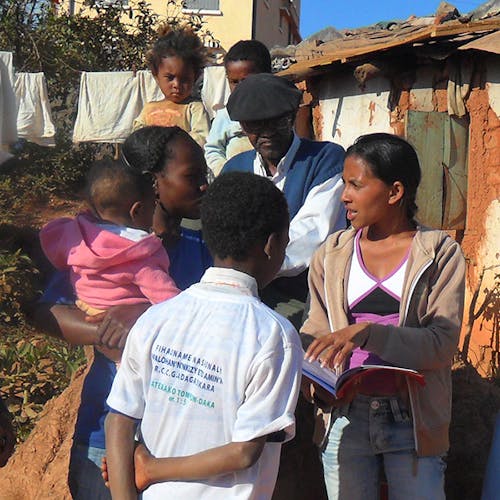
Teaching the Cause
Book 6
People from every background are welcome to explore the teachings of Bahá’u’lláh and learn how they can apply them to better their lives. All Bahá’ís, then, share liberally and unconditionally the teachings and precepts of their Faith. Although the propagation of Bahá’u’lláh’s message is one of the most essential services to be rendered, teaching is also a natural expression of a state of being—a state in which one is moved to share with others the knowledge and joy one finds in His Revelation. This concept is explored in the first unit of Book 6, “The Spiritual Nature of Teaching”. It takes as its premise the understanding that “being” and “doing” are inseparable aspects of a spiritual life. The second and third units, “Qualities and Attitudes Essential for Teaching” and “The Act of Teaching”, take this premise further. The second unit considers how one’s inner state contributes to, and is strengthened by, one’s efforts in the field of service, while the third looks at how the act of teaching should be approached. Of particular significance is the example offered in the third unit, through the story of Anna and Emilia, of how to introduce the Faith to someone who knows little about it.
“As they call on one another in their homes and pay visits to families, friends and acquaintances, [they] share Bahá’u’lláh’s message, and welcome increasing numbers to join them in a mighty spiritual enterprise.”
21 April 2008 message from the Universal House of Justice

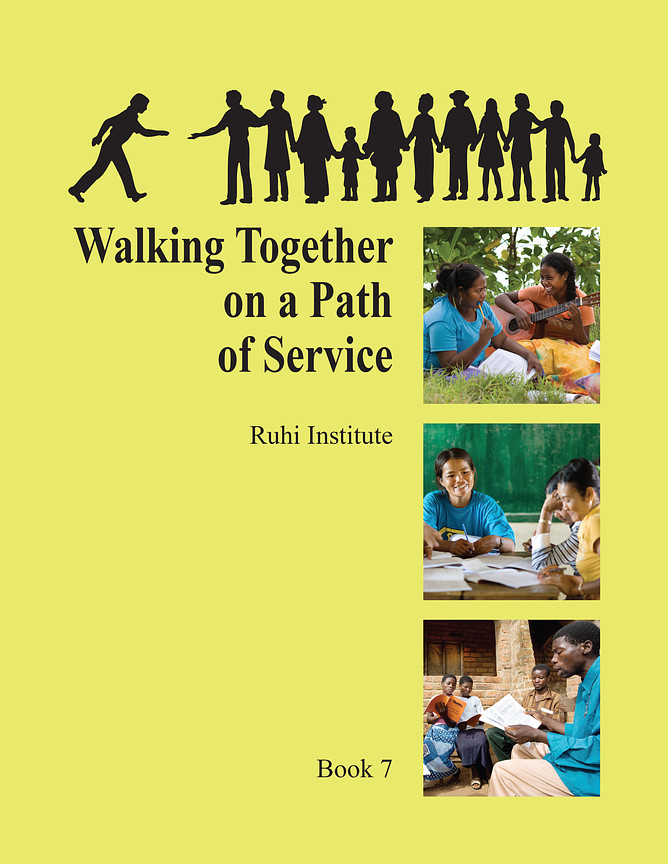
Book 7 is dedicated to an act of service crucial to the capacity-building process envisioned in the materials of the Ruhi Institute—namely, helping a group of individuals study its main sequence of courses. That individuals accompany one another on a path of service to their communities is central to this capacity-building process. The first unit of the book explores the spiritual dynamics of advancing on the path traced out by the courses and raises awareness of some of the forces at work. The second unit, “Serving as a Tutor of the Institute Courses,” examines those concepts, attitudes, qualities and skills that enable an individual to carry out this act of service, generally by bringing together eight or ten friends in what is termed a “study circle”. The third unit, “Promoting the Arts at the Grassroots,” is designed to create an appreciation for the role that artistic endeavors can play in enhancing the educational process fostered by the courses and in strengthening the patterns of community life to which it gives rise.
“Thousands upon thousands, embracing the diversity of the entire human family, are engaged in systematic study of the Creative Word in an environment that is at once serious and uplifting.”
21 April 2008 message from the Universal House of Justice
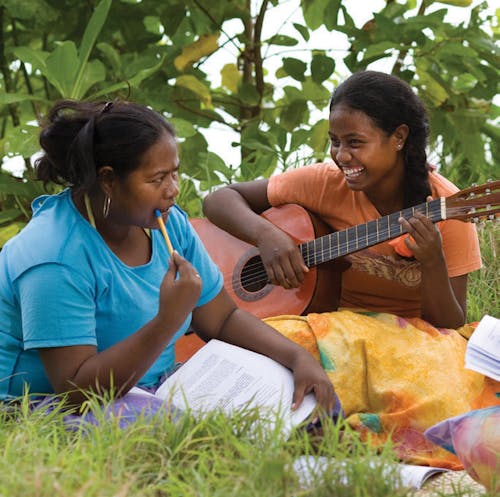
Walking Together on a Path of Service
Book 7
Book 7 is dedicated to an act of service crucial to the capacity-building process envisioned in the materials of the Ruhi Institute—namely, helping a group of individuals study its main sequence of courses. That individuals accompany one another on a path of service to their communities is central to this capacity-building process. The first unit of the book explores the spiritual dynamics of advancing on the path traced out by the courses and raises awareness of some of the forces at work. The second unit, “Serving as a Tutor of the Institute Courses,” examines those concepts, attitudes, qualities and skills that enable an individual to carry out this act of service, generally by bringing together eight or ten friends in what is termed a “study circle”. The third unit, “Promoting the Arts at the Grassroots,” is designed to create an appreciation for the role that artistic endeavors can play in enhancing the educational process fostered by the courses and in strengthening the patterns of community life to which it gives rise.
“Thousands upon thousands, embracing the diversity of the entire human family, are engaged in systematic study of the Creative Word in an environment that is at once serious and uplifting.”
21 April 2008 message from the Universal House of Justice

The Covenant of Bahá’u’lláh
Book 8 (pre-publication edition)
The units that will make up this book are currently available in pre-publication form, and a description of their content is forthcoming.
The Covenant of Bahá’u’lláh
Book 8 (pre-publication edition)
The units that will make up this book are currently available in pre-publication form, and a description of their content is forthcoming.
Gaining an Historical Perspective
Book 9 (pre-publication edition)
The units that will make up this book are currently available in pre-publication form, and a description of their content is forthcoming.
Gaining an Historical Perspective
Book 9 (pre-publication edition)
The units that will make up this book are currently available in pre-publication form, and a description of their content is forthcoming.
Building Vibrant Communities
Book 10 (pre-publication edition)
The units that will make up this book are currently available in pre-publication form, and a description of their content is forthcoming.
Building Vibrant Communities
Book 10 (pre-publication edition)
The units that will make up this book are currently available in pre-publication form, and a description of their content is forthcoming.
Material Means
Book 11 (material in development)
The units that will make up this book are currently available in pre-publication form, and a description of their content is forthcoming.
Material Means
Book 11 (material in development)
The units that will make up this book are currently available in pre-publication form, and a description of their content is forthcoming.
Family and the Community
Book 12 (material in development)
The units that will make up this book are currently available in pre-publication form, and a description of their content is forthcoming.
Family and the Community
Book 12 (material in development)
The units that will make up this book are currently available in pre-publication form, and a description of their content is forthcoming.
Engaging in Social Action
Book 13 (material in development)
The units that will make up this book are currently available in pre-publication form, and a description of their content is forthcoming.
Engaging in Social Action
Book 13 (material in development)
The units that will make up this book are currently available in pre-publication form, and a description of their content is forthcoming.
Participating in Public Discourse
Book 14 (material in development)
The units that will make up this book are currently available in pre-publication form, and a description of their content is forthcoming.
Participating in Public Discourse
Book 14 (material in development)
The units that will make up this book are currently available in pre-publication form, and a description of their content is forthcoming.
Regarding the learning process set in motion by study of the courses, especially its participatory nature, one of the early collaborators of the Ruhi Institute has written:
. . . we are members of communities scattered across the globe that are engaged in the greatest of all enterprises, that of building a new civilization. Our conversations—conversations in action—about the various aspects of this enterprise are carried out in so many settings: the Nineteen Day Feast, meetings of Spiritual Assemblies and committees, Summer Schools, deepening classes, conferences, teaching projects, social and economic development endeavors, and so on. The main sequence of courses of the training institute seeks to systematize a crucial aspect of our global discourse concerned with the development of communities that are striving to apply the Bahá’í teachings. An increasing number of people in every corner of the globe are engaged in such conversations in a setting we call a study circle. The material we study organizes this conversation. It records the principal points and ensures that our thoughts and actions are illumined by relevant passages from the writings of the Faith.

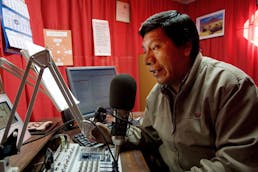
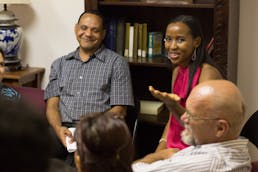
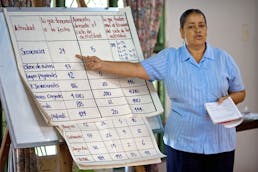

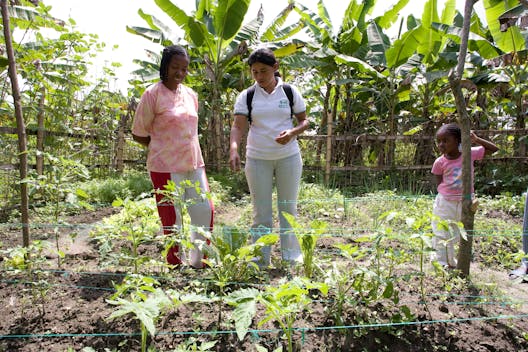
In this setting, the tutor of the study circle is saying something like this: “We are walking a path of service that allows us to contribute to the development of communities cognizant of the material and spiritual dimensions of existence. The way we do this is by studying, acting and reflecting on action in the light of what we have studied. These materials have helped me develop some of the capabilities I need to walk this path. I believe they will help you as well. Thousands of other groups in the world are doing the same. They are having the same conversation, and a vast experience is being created among peoples of every background under diverse conditions. What we do will be part of this global experience. What we say enriches the conversation. What we learn will be systematized and diffused among communities throughout the world by the institutions we have already established. Our participation in this study circle can be seen in this light. We are participating in a global learning process, learning that builds the capacity of the Bahá’í community to open wide its doors to the peoples of the world . . .”
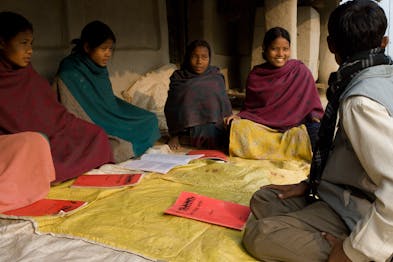
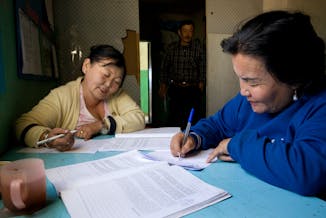
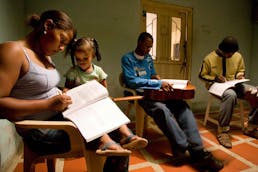
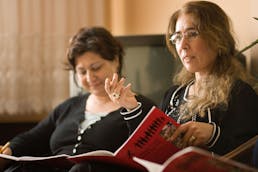
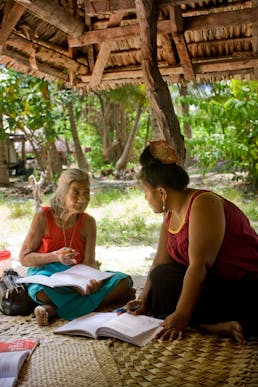
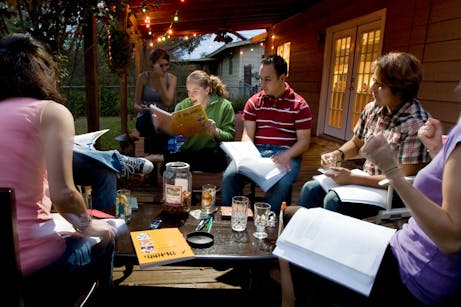
Regarding the learning process set in motion by study of the courses, especially its participatory nature, one of the early collaborators of the Ruhi Institute has written:
. . . we are members of communities scattered across the globe that are engaged in the greatest of all enterprises, that of building a new civilization. Our conversations—conversations in action—about the various aspects of this enterprise are carried out in so many settings: the Nineteen Day Feast, meetings of Spiritual Assemblies and committees, Summer Schools, deepening classes, conferences, teaching projects, social and economic development endeavors, and so on. The main sequence of courses of the training institute seeks to systematize a crucial aspect of our global discourse concerned with the development of communities that are striving to apply the Bahá’í teachings. An increasing number of people in every corner of the globe are engaged in such conversations in a setting we call a study circle. The material we study organizes this conversation. It records the principal points and ensures that our thoughts and actions are illumined by relevant passages from the writings of the Faith.
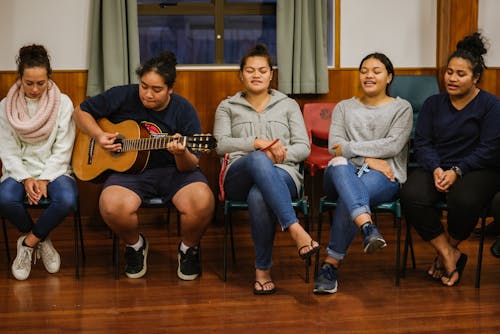
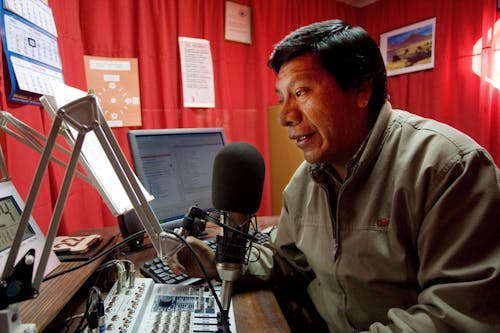
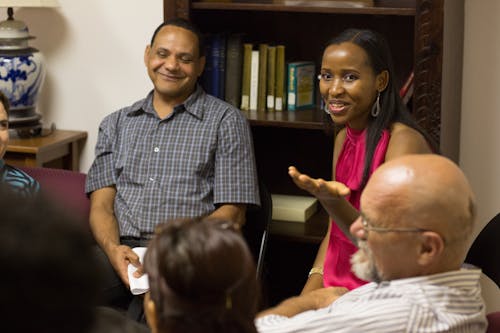
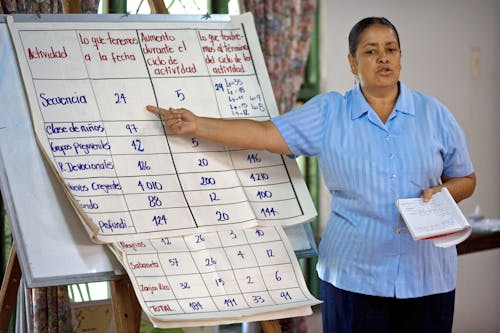

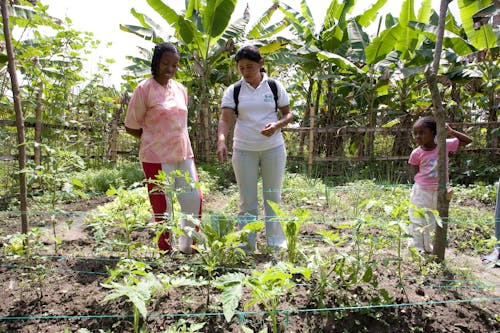
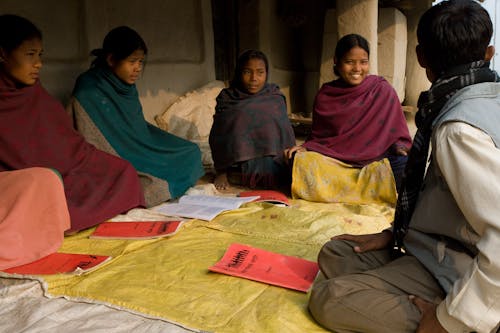
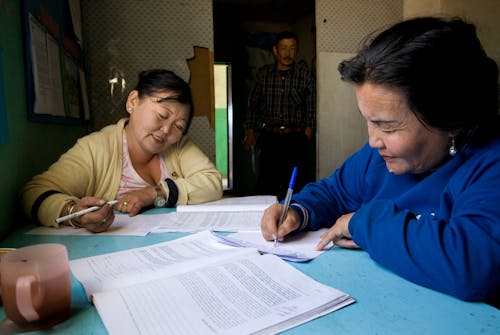
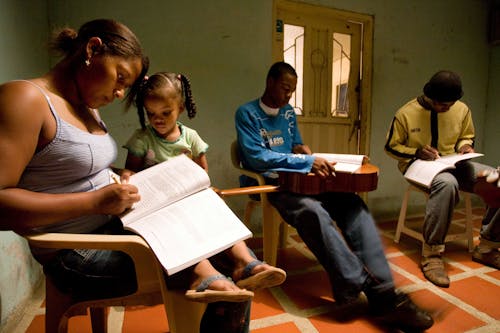
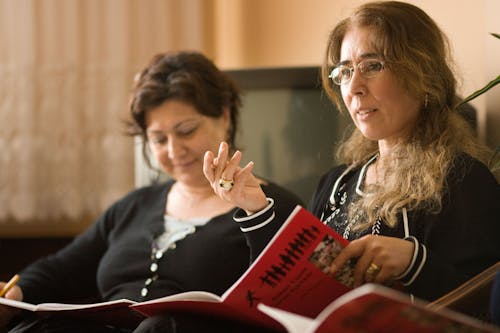
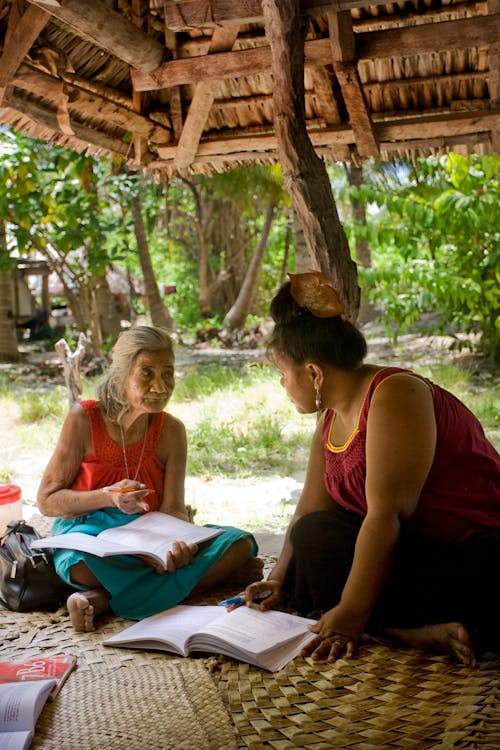
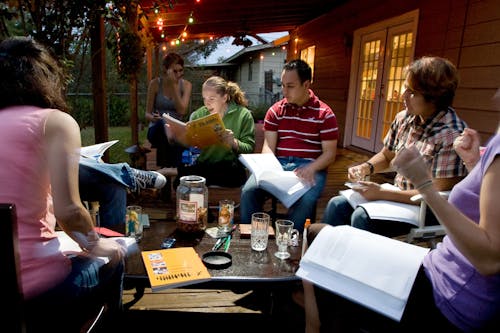
In this setting, the tutor of the study circle is saying something like this: “We are walking a path of service that allows us to contribute to the development of communities cognizant of the material and spiritual dimensions of existence. The way we do this is by studying, acting and reflecting on action in the light of what we have studied. These materials have helped me develop some of the capabilities I need to walk this path. I believe they will help you as well. Thousands of other groups in the world are doing the same. They are having the same conversation, and a vast experience is being created among peoples of every background under diverse conditions. What we do will be part of this global experience. What we say enriches the conversation. What we learn will be systematized and diffused among communities throughout the world by the institutions we have already established. Our participation in this study circle can be seen in this light. We are participating in a global learning process, learning that builds the capacity of the Bahá’í community to open wide its doors to the peoples of the world . . .”
